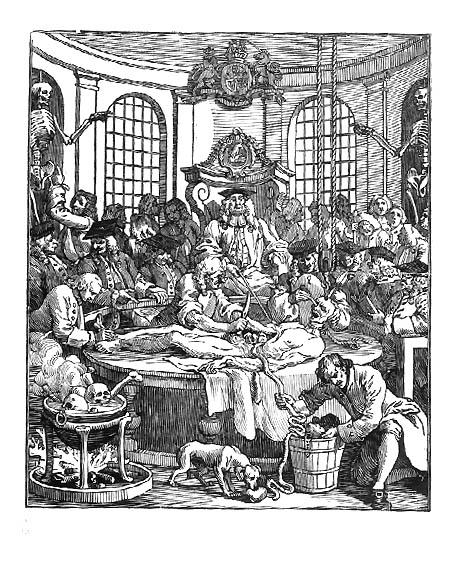 William Hogarth, The Fourth Stage of Cruelty
William Hogarth, The Fourth Stage of Cruelty
There are a number of images of cutting up human bodies in Swift’s satire. In this post I am going to explore why.
In Book I of Gulliver’s Travels, the Lilliputians, when they want to punish Gulliver for his “traitorous” decision not to obliterate Blefescu, consider starving him to death and then cutting him up so that his rotting corpse won’t set off a plague. In Book IV he cuts up yahoos to provides skins and sails for his boat. (He also uses yahoo fat to caulk the hull.) And, most famously, in “A Modest Proposal for Preventing the Children of Poor People in Ireland from Being a Burden to their Parents or Country, and for Making Them Beneficial to the Public,” his speaker proposes killing and eating babies to solve Ireland’s economic woes.
“Modest Proposal” may be the most famous essay ever written. At any rate, it is the most anthologized essay in the English language. It is a brilliantly executed joke in which readers find themselves alternately horrified and amused.
I think a little psychology is useful here. When I was in middle school, my classmates and I were fascinated by what were called “dead baby jokes.” Here’s an example of one. Q: What’s the difference between a truckload of bowling balls and a truckload of dead babies? A: You can’t unload a truckload of bowling balls with a pitchfork.
We weren’t particularly abnormal or monstrous. We’ve grown up to become fairly civilized professors and architects and dentists. So what was going on?
Puberty is as rough a time as there is in a normal life. As one begins leaving the protected environment of childhood, one encounters a world that is often brutal and insensitive. Babies, for us, symbolized innocence, and by making jokes about the death of innocence, I believe we were finding a way to cushion ourselves against this brutal transition. If we could laugh at the process, somehow we could convince ourselves that we were in control. Much of black humor, especially jokes about death, may be motivated by similar anxieties.
Swift was a sensitive man who felt cut up by the world. Through his images of people getting sliced up, he was coming up with his own visual equivalents for how he felt. His dead baby joke, I think, was his way of laughing at his own innocent idealism. Or better yet, he was simultaneously laughing at his idealism while fighting for an idealistic cause. (The rights of the Irish was about as idealistic as it got in the 18th century.) He found a way, just as we kids perhaps had found a way, to protect a precious part of himself.
Did “Modest Proposal” work? Perhaps it worked as well as anything in a hopeless cause. At the very least, it managed raise awareness of the issues in a way that Swift’s more straightforward and earnest proposals had not.
My posts on Swift were set off by the question, how do idealists (whether Bush or Obama supporters) when things turn sour? Humor, humility, and perspective, Swift seems to counsel us. Those will help us to keep fighting the good fight.

